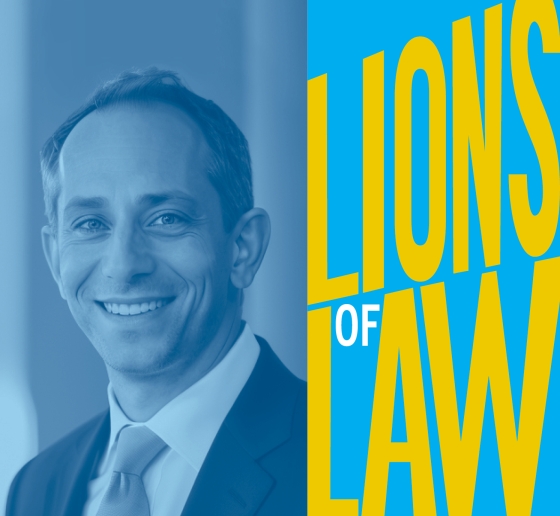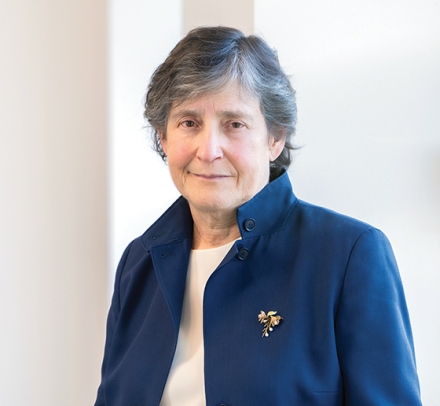Eric Rosen ’05: A Pathbreaking Prosecutor Turns to Private Practice
The federal prosecutor who revealed a fraud scheme in elite college admissions now pursues his entrepreneurial dream of founding a law firm.

Eric Rosen ’05 would like to say that yes, he knew immediately that the “Varsity Blues” college admissions case he prosecuted as an assistant U.S. attorney would become a huge story and touch a national parental nerve.
But he didn’t—even after a 10-month investigation of wealthy parents who used bribes and fraud to secure admissions for their children at several elite universities, and after developing the largest-ever college admissions conspiracy case prosecuted by the Justice Department—until the day in 2019 that he stood behind U.S. Attorney Andrew Lelling at a crowded Boston news conference to announce the indictment of more than 50 people, including TV stars, prominent business executives, and college athletics coaches. There were “a ton of cameras there,” Rosen remembers. And inside his suit jacket pocket, his phone started buzzing—and buzzing and buzzing.
“It was an incredible, incredible response. I was completely dumbfounded and shocked,” he says. “When you’re [preparing] a case, you’re just focused on, ‘Did I get it right? Did I get it wrong? Did this person commit a crime?’ It’s not until later that you start to analyze any residual impact.”
Operation Varsity Blues, as the investigation was known, resulted in more than 50 convictions and stained the reputations of several highly selective colleges. For Rosen, the case earned him national recognition and spurred his next step in a career built on entrepreneurial drive: founding a boutique litigation firm.
“I’ve always been someone who enjoys entrepreneurial activities,” he says. “I wanted to take a risk and really do something for myself and prove that I could do it.”
The Varsity Blues prosecutions were “a crash course in white-collar criminal defense,” Rosen says. The well-heeled defendants could hire “the best attorneys in America—and I was on the receiving end. Within the space of two years, I learned a decade’s worth of lessons.”
Rosen quickly put those lessons to use, joining Boston firm Roche Freedman as a partner in 2021 and then, in July 2023, founding the law firm Dynamis, also based in Boston. The firm has grown to 12 lawyers and focuses on white-collar criminal and regulatory defense.
“I always ask people—when they’re thinking about law school, litigation, or joining Dynamis—do you like to fight? Do you like being in an adversarial process where one side wins and one side loses?” he says. “Does that rev you up in the morning, or not?” For Rosen, and the other lawyers in his firm, “it does.”
From Prosecution to Defense
The business bug bit Rosen during his time as an undergraduate at Harvard University: He sums up his many undergraduate jobs—working in the admissions office, bartending, designing websites, cleaning dorm bathrooms—as “Rosen Enterprises.” After graduating, he spent two years as a financial analyst in London, learning what he did not want to do with his life. “I was terrible. Not because I didn’t get it, but because I just didn’t have the passion and drive to do it,” he recalls.
“It was inevitable that I would go to law school. I like the banter, the arguments, thinking of strategies,” he adds. “In law school, the professors put the ball in your court. You can do a lot of different things, but it’s your responsibility. And I like that.”
Columbia Law School was the right fit. “I liked the curriculum the best, the prestige of it, and the ability to be in New York. I’d never lived in New York. I really wanted to live there,” he says. “And I felt I wasn’t quite artsy enough to go to NYU.”
As a 3L, Rosen earned an LL.M. at SOAS University of London. But his 2L externship at the Manhattan District Attorney’s Office showed him his calling: the courtroom.
“I was always the guy who wanted to do more: be on my feet and argue and not wait my turn,” he says.
That led to a post-graduation job as an assistant district attorney in Manhattan, a clerkship for Judge Robert P. Patterson Jr. of the Southern District of New York, and a role as assistant U.S. attorney—first in Pittsburgh, where his wife, a physician, was in training, and then in his hometown, Boston.
“I loved it,” he says of being a federal prosecutor. “It’s one of those jobs where you like getting up every day. I loved the investigative work, the use of wiretaps and various things, and outsmarting the bad guy.”
After more than a decade of public service, including two years on the Varsity Blues case, the entrepreneurial bug bit again. “I was looking for the next challenge,” he says. “I had that itch—not to go to a big firm but to run a business that I would start.”
Rosen started the law firm with a partner, Constantine Economides, but they decided not to name it after themselves—avoiding the issue of whether to add future partners to the firm name. “We wanted to make it easy for really top talent to join us and not feel that we had to change our email address every 10 minutes to accomplish that,” he says.
Dynamis has developed a specialty in cryptocurrency cases, both litigating disputes among partners in crypto businesses and representing investors whose crypto money has disappeared.
“What I like about crypto is that within this one niche, you have white-collar, you have plaintiff-side civil, you have multijurisdictional issues, and you have crazy class actions,” Rosen says. “You have all sorts of things to defend.”
It turns out that Eric Rosen the defense lawyer is not all that different from Eric Rosen the prosecutor.
“I’m a very passionate guy. I think if you don’t believe your story, the judge is not going to believe your story. So I’m really animated,” he says. (Unless the client wishes to plead guilty. That, he says, “is not the same type of advocacy. It’s still passionate, but in a very different, humble way, as opposed to pounding the table.”)
Plaintiff work calls on the investigative skills he learned as a prosecutor. “It’s the same sort of type of advocacy as you did for the government: Here’s someone who has been wronged; here’s why they should get relief.”
He takes satisfaction, too, in meeting the challenges of defense work. “You’re starting from a very deep hole, generally. The government has amassed all the evidence against your client. You’re digging out of that,” he says. “The wins are fewer on the defense side. But when you get them, they’re much more satisfying.”
Rosen describes the experience of running a young law firm as “75% legal, 25% admin.” The administrative side means not only “making sure people have health insurance, get paid, have a 401(k), have office space,” he says, but also “making sure we have people to cover assignments, that we’re growing, and also, most important, that we do the cases that we want to do and attract the clients that we want to attract.”
After two years heading his firm, the biggest surprise to Rosen is that his entrepreneurial idea is working out just fine.
“The shock for me, honestly, was: ‘We can do this,’” he says. “This was a pipe dream. And it’s something that we can achieve.”
